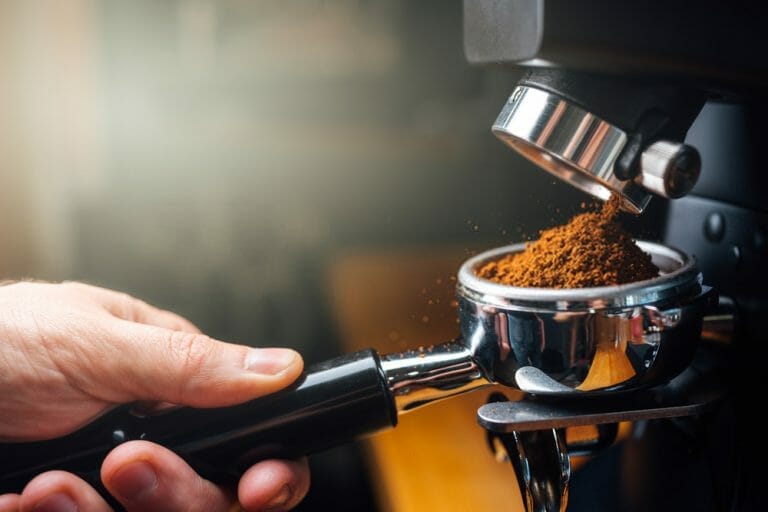How To Dispose Of Broken Coffee Maker – Check Out Now!!!

Do you have a broken coffee maker taking up space in your kitchen? It can be frustrating to have an appliance that is no longer working, but it doesn’t have to be a burden.
Knowing how to properly dispose of your broken coffee maker can not only clear up space, but also benefit the environment and possibly even help someone else.
In this article, we will provide you with different options for getting rid of your broken coffee maker.
From donating it to contacting the manufacturer, there are various ways to responsibly dispose of your appliance.
By choosing the right method for disposal, you can feel good about reducing waste and potentially giving someone else a chance to enjoy their morning cup of joe.
Donating or Giving Away Your Broken Coffee Maker
You can still spread joy to a fellow caffeine lover by passing on your trusty morning companion that’s seen better days.
Donating or giving away a broken coffee maker isn’t just an eco-friendly way of disposing it, but also helps someone else get their daily dose of energy without spending too much money.
You can start by checking with local charities and goodwill stores if they accept broken appliances as donations.
They may repair the machine and sell it at a discounted price to someone in need. Another option is to give it away for free through online platforms such as Craigslist or Facebook Marketplace.
Make sure you’re transparent about the condition of the coffee maker and include clear photos so potential takers know what they’re getting into.
Not only will you be saving the appliance from ending up in a landfill, but you might also make someone’s day by providing them with an unexpected gift.
Once you’ve exhausted all avenues for donating or giving away your broken coffee maker, it’s time to check with your local waste company for proper disposal methods.
Checking with Your Local Waste Company
Before tossing out your morning energy booster, it’s worth checking with the folks who know all about the different ways to handle items that have reached the end of their usefulness.
Your local waste management provider may offer a special pick-up service for larger appliances like coffee makers. They can tell you what types of materials can be recycled and what can’t, as well as any fees associated with disposal.
It’s important to check local recycling laws too, since some areas have specific regulations on how to dispose of broken coffee makers.
If your waste company doesn’t provide a special pick-up service, they may direct you to a nearby recycling center where you can drop off your broken coffee maker.
Recycling centers are equipped to handle various electronic devices, and will often dismantle them in order to recover valuable components like copper and aluminum.
By taking advantage of these services, you’ll help ensure that your coffee maker is disposed of properly and won’t contribute to environmental pollution.
When returning your broken coffee maker to the store isn’t an option, don’t worry! There are still plenty of ways to responsibly dispose of it.
Returning Your Broken Coffee Maker to the Store
Returning a faulty coffee machine to the store may be an option worth exploring if other disposal methods aren’t available.
Many retailers offer recycling programs that allow customers to drop off their old coffee maker for proper disposal.
This is especially true for larger chain stores like Walmart, Target, and Best Buy. Before making a trip to the store, however, it’s important to check with them first to see if they accept unwanted coffee makers.
When you bring your old coffee maker back to the store, make sure it’s properly packaged and labeled as ‘defective’ or ‘damaged.’ Some stores may also require proof of purchase or a warranty to process the return.
Once you’ve successfully returned your broken coffee maker, consider purchasing a new one that’s more energy-efficient and environmentally friendly. If returning your coffee maker isn’t an option, then contacting the manufacturer directly may be the next best step.
Contacting the Manufacturer
If your machine is malfunctioning and you want to explore other options, contacting the coffee maker manufacturers directly may be a good choice.
Most companies have customer service departments that are dedicated to helping customers with any issues they may have.
You can usually find the manufacturer’s contact information on their website or in the instruction manual that came with your old coffee maker.
When you reach out to the manufacturer about how to dispose of broken coffee makers, they may be able to offer you a few different options.
Some companies have recycling programs where they will take back old coffee makers and either repair them or recycle their parts.
This is often a great option because it helps reduce electronic waste and ensures that your old appliance is being disposed of safely.
If this isn’t an option, the manufacturer might also be able to help you troubleshoot your machine or offer advice on how best to dispose of it yourself.
Either way, reaching out directly can often provide you with more personalized assistance than simply returning it to the store would.
As such, let’s now move onto discussing electronic recycling centers: safely disposing of your broken coffee maker.
Electronic Recycling Centers: Safely Disposing of Your Broken Coffee Maker
Looking to safely and responsibly part ways with your trusty caffeine companion? Electronic recycling centers provide a convenient option for giving your beloved brew buddy a proper farewell.
These centers specialize in electronic waste disposal, ensuring that the materials in your broken coffee maker are safely and properly recycled.
Here are some benefits of recycling coffee makers at an electronic recycling center:
- Convenience: Many cities have electronic recycling centers conveniently located for easy drop-off.
- Environmental Impact: Recycling your broken coffee maker helps reduce waste in landfills, which can harm the environment.
- Legal Compliance: In some states, it’s illegal to dispose of electronic waste in regular trash cans. Using an electronic recycling center ensures that you comply with local regulations.
- Material Recovery: Recycling centers carefully extract the valuable materials from broken coffee makers, such as copper wiring and plastic parts, which can be repurposed or sold.
By choosing to recycle your broken coffee maker at an electronic recycling center, you can do your part for both the environment and legal compliance.
Plus, you’ll know that its parts and materials will be properly handled instead of sitting in a landfill.
So next time you’re wondering how to dispose of a broken coffee maker, consider taking it to an electronic recycling center near you!
FAQs
Conclusion
In summary, dealing with worn out coffee maker disposal, especially for items like your non-working coffee machines or even a glass coffee pot, might appear daunting, but a plethora of solutions are at your disposal.
Donating or passing on your malfunctioning espresso machines or even your Keurig coffee maker to coffee enthusiasts is an excellent method to breathe new life into them and assist others. This could be done through a local Goodwill store or even online.
Consulting with your local waste company or local store can guarantee that your coffee machines, including your new coffee machines, are discarded in a manner that is friendly to the environment, not just other kitchen appliances.
Returning your defective coffee machines to retail stores or reaching out to coffee brands can also prove beneficial, particularly if they’re still under warranty. This includes options to recycle coffee makers online or at physical locations.
Moreover, electronic recycling centers are secure and trustworthy locations to recycle small appliances, including your coffee machines, as well as any other office appliances you might have lying around.
By investing effort to correctly recycle your non-working kitchen appliances, you’re not only contributing to the coffee maker disposal process but also ensuring that coffee lovers and others won’t be affected by its improper disposal. This makes it an essential household responsibility.





